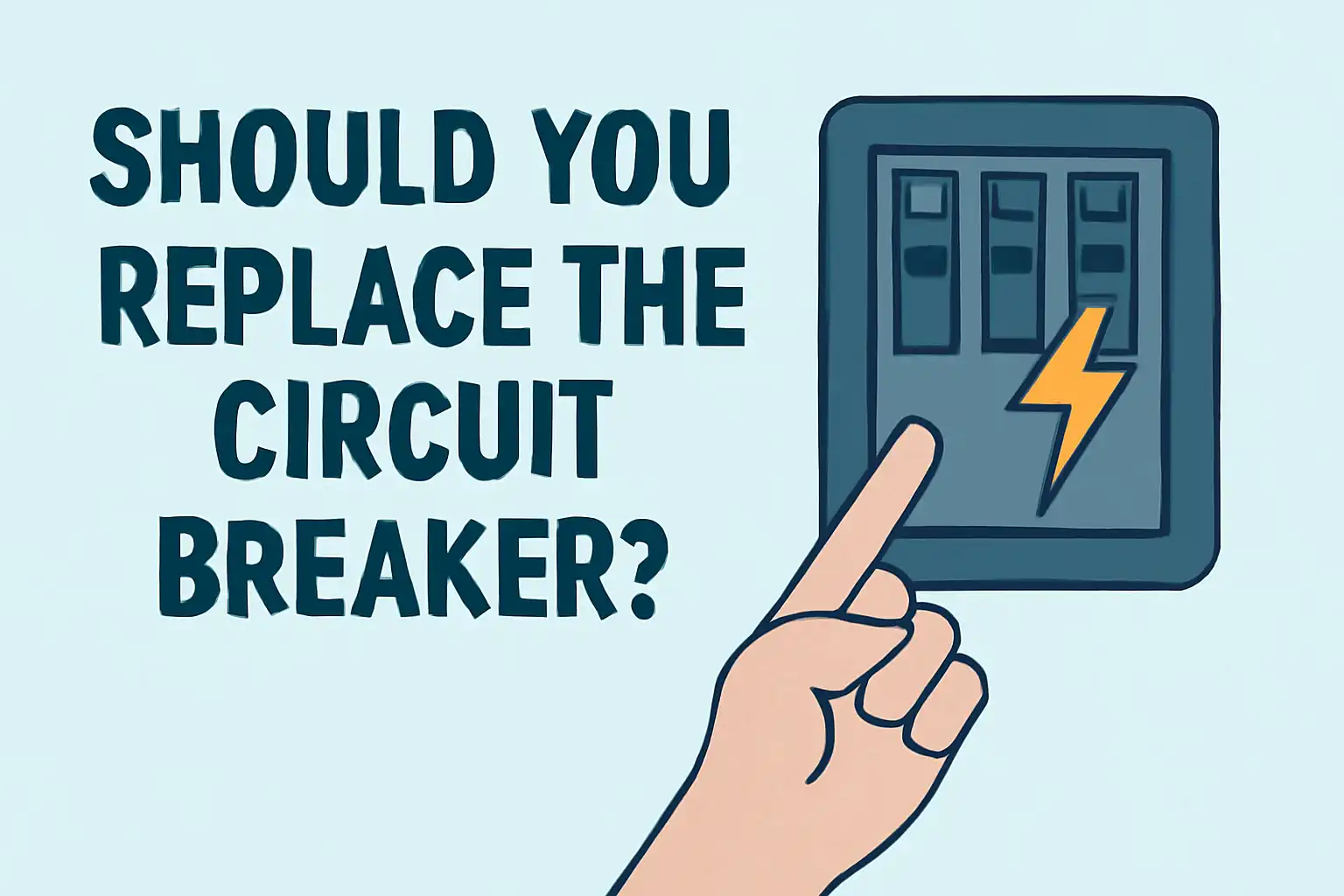Does your air conditioner circuit breaker keep tripping? This issue occurs when your AC draws more power than it should. Several factors can cause this problem. Dirty coils or clogged air filters can force your AC to work harder, leading to overheating. Faulty wiring or a damaged circuit breaker might also be to blame. Additionally, low refrigerant levels can strain your system excessively. Your air conditioner relies on a consistent electrical supply to function correctly, and any disruption can cause the breaker to trip as a safety measure. Addressing these problems promptly can help you avoid costly repairs.
Key Takeaways
-
Clean or change air filters often to keep airflow steady. This stops your AC from overworking and tripping the breaker.
-
Check and clean condenser coils once a year or more. Dirty coils can make your AC overheat and use too much energy.
-
Look for broken wires or loose connections. These problems can be unsafe and make your AC trip the breaker a lot.
-
Watch refrigerant levels and check for leaks. Too little or too much refrigerant can stress your AC and trip the breaker.
-
Think about getting a new AC if yours is old. Newer models use less energy and handle power needs better.
Dirty Condenser Coils and Air Filters
How Dirty Coils and Filters Cause Breaker Trips
If your air conditioner struggles to cool, dirt might be the problem. Dirty condenser coils or clogged air filters can block airflow. These parts are important for cooling and heat exchange. When they’re dirty, your AC works harder and uses more power. This can make the circuit breaker trip.
Here’s what happens:
-
Dirty filters block airflow, making the compressor work too hard.
-
Blocked coils trap heat, causing the system to overheat.
-
This extra stress can lead to overheating or short circuits, which trip the breaker for safety.
Even a little dirt can cause big problems. The EPA says just 0.042 inches of dirt on coils can lower efficiency by 21% and raise energy use by 35%. This shows how important clean parts are for your AC.
Signs Your Coils or Filters Need Cleaning
How do you know if your AC needs cleaning? Watch for these signs:
-
Reduced Cooling Efficiency: If your AC isn’t cooling well, dirty coils could be the reason.
-
Higher Energy Bills: A sudden rise in your bill might mean your AC is working too hard.
-
Uneven Cooling: If some rooms are cooler than others, dirt might be blocking airflow.
-
Longer Cooling Cycles: If your AC takes too long to cool, dirt could be slowing it down.
-
Warm Air Blowing: Warm air from vents might mean dirty evaporator coils.
-
Unusual Noises: Strange sounds could mean your AC is struggling to work.
Pay attention to these signs. They’re warnings that your AC needs care before bigger problems happen.
Cleaning and Maintenance Tips for Coils and Filters
Taking care of your AC doesn’t have to be hard. Regular cleaning can stop breaker trips and help your AC last longer. Here’s a simple guide:
|
Component |
Maintenance Practice |
Recommended Interval |
|---|---|---|
|
Air Filters |
Replace disposable filters or clean reusable |
Every 1-3 months |
|
Coils |
Clean coils |
Annually |
|
Fans |
Check and clean fan blades |
Periodically |
|
Ductwork |
Inspect for leaks and clean |
As needed |
Start by checking your air filters. Wash reusable ones with water and let them dry. Replace disposable filters every 1-3 months. Cleaning condenser coils takes more effort. Use a coil cleaner or soft brush to remove dirt. Always turn off the AC’s power before cleaning.
Regular maintenance keeps your AC running well and prevents breaker trips. A little work now can save you money and keep your home cool.
Electrical Wiring and Circuit Breaker Problems
If your air conditioner keeps tripping the breaker, wiring might be the issue. Broken wires, loose connections, or an old breaker can stop electricity from flowing. These problems are not just annoying but also dangerous. Let’s look at why they happen and how they affect your AC.
Broken or Worn-Out Wires
Worn-out wires often cause breaker problems. When wires get damaged, they can short circuit. A short circuit happens when a hot wire touches a neutral wire, causing too much electricity to flow. This overload trips the breaker.
-
Exposed wires can spark or overheat, creating safety risks.
-
Animals chewing wires can damage them, leading to short circuits.
-
Burn marks on wires show overheating or electrical trouble.
You might see black marks near outlets or smell something burning. These signs mean your wiring needs fixing. Ignoring them can cause more trips or even fires.
If you think wires are damaged, turn off your AC and call an expert. Fixing electrical problems yourself can be unsafe.
Loose Connections in the System
Loose connections can also cause problems for your AC. When connections are not tight, electricity flows unevenly. This makes your AC work harder, which can cause overheating and poor performance.
Here’s what loose connections can do:
-
Voltage spikes can harm your AC’s electrical parts.
-
Low voltage can stop your AC from working right.
-
Extra current from bad connections can cause fires or short circuits.
Over time, these problems wear out your AC. You might notice your AC turning on and off a lot or not cooling well. If you think connections are loose, call a technician. They can fix or replace bad connections to make your system stable again.
Should You Replace the Circuit Breaker?
Sometimes, the breaker itself is the problem, not your AC. Older breakers may not handle the power your AC needs. If your breaker trips often, it might need replacing.
Here’s when to think about a new breaker:
-
The breaker trips even after fixing wiring or AC issues.
-
It feels hot or smells like something is burning.
-
Your home’s electrical panel is too old for your AC’s power needs.
New breakers are safer and more efficient. They can handle more power and have features to prevent electrical fires. These upgrades help your AC run better and keep your home safe.
If you’re not sure about replacing your breaker, ask an electrician. They can check your system and suggest the best fix.
Fixing wiring and breaker problems quickly can stop trips and keep your AC working well.
Refrigerant Problems
How Incorrect Refrigerant Levels Cause Overload
Your air conditioner needs the right refrigerant amount to cool properly. If levels are too low or high, your AC struggles. This makes it work harder, using more power, and can trip the breaker.
Low refrigerant often means leaks, which reduce cooling ability. Too much refrigerant creates high pressure, causing overheating. Both problems strain your AC and risk electrical overload.
If your breaker trips a lot, it might be a refrigerant issue. Fixing this quickly can stop more damage to your system.
Identifying Refrigerant Leaks
Finding refrigerant leaks can be hard, but experts have ways to check:
-
Electronic Detectors (SAE J2791): These tools find tiny leaks with great accuracy.
-
Dye Injection: A dye is added to show leaks under UV light.
-
Types of Leaks: Active leaks happen when running; passive leaks occur when cooling down.
Signs of leaks include less cooling, hissing sounds, or ice on coils. Don’t ignore these signs, as they can cause bigger problems.
Fixing Refrigerant Issues Safely
Fixing refrigerant problems must be done carefully to stay safe. Here’s what to do:
-
Use tools like detectors or bubble solutions to find leaks.
-
Wear safety gear to avoid harmful refrigerant exposure.
-
Follow rules for refrigerant disposal to protect the environment.
Certified HVAC technicians should handle refrigerant repairs. They have the skills to fix leaks, refill refrigerant, and test the system. Fixing these issues safely helps your AC work better and stops breaker trips.
High Power Draw During Start-Up
Why AC Units Use More Power When Starting
When your AC turns on, it needs extra power to start. This happens because the compressor and fan motors need more energy to begin working. It’s like starting a car—it takes more effort to start than to keep running.
This extra power can strain your home’s electrical system. If your circuit breaker trips when the AC starts, it’s likely because the power surge is too much for the breaker. Older AC systems often have this problem since they aren’t as energy-efficient as newer ones.
Signs of Start-Up Power Problems
It’s not always easy to spot start-up power issues, but here are some clues:
-
Frequent Breaker Trips: If the breaker trips every time the AC starts, it’s a sign.
-
Slow Start: If your AC struggles to turn on, it may need too much power.
-
Weird Noises: Buzzing or grinding sounds during start-up could mean motor trouble.
-
Burning Smell: A burning odor might mean the electrical system is overheating.
If you notice these signs, don’t ignore them. Start-up power problems can cause bigger issues, like damage to your AC or electrical system.
Fixing High Power Draw Problems
Fixing high power draw doesn’t have to be hard. Here are some solutions:
|
Solution Description |
How It Helps |
|---|---|
|
Add variable speed fan drives to AC units |
Makes fans adjust speed to match cooling needs |
|
Install an air-side economizer |
Cuts cooling power use by up to 60% |
|
Remove unused servers (zombie servers) |
Lowers power use, as many servers waste energy |
|
Use virtual servers |
Saves 10%-40% on energy and costs |
For homes, adding a variable speed fan drive to your AC is very helpful. It lets your AC start smoothly by matching fan speed to cooling needs. For bigger systems, installing an air-side economizer can save a lot of energy.
Ask an HVAC technician for advice on the best solution for your system. They can check your setup and suggest upgrades to lower start-up power. These fixes can stop breaker trips and help your AC last longer.
Compressor and Motor Problems
Common Issues with Compressor and Motor
The compressor and motor are key parts of your AC. If they fail, the circuit breaker might trip because they use too much power. Problems like poor upkeep, electrical failures, or clogged drains can cause this.
Here’s a list of common problems and fixes:
|
Problem Type |
What Happens |
How to Fix |
|---|---|---|
|
Poor Maintenance |
Dirty filters or coils can harm the compressor or fan. |
Replace filters often and make sure they fit properly. |
|
Electrical Control Issues |
Corrosion or frequent cycling can damage controls. |
Inspect electrical connections during routine service. |
|
Sensor Troubles |
Thermostat problems can mess up temperature readings. |
Place thermostats correctly and keep them clear of blockages. |
|
Drainage Blockages |
Clogs stop water from draining, especially in humid weather. |
Clean the drain line regularly to avoid mold and ensure proper flow. |
If your AC struggles to start or makes odd sounds, these might be the cause. Regular care can prevent these problems.
Why These Problems Trip the Breaker
When the compressor or motor has issues, the AC works harder. This uses more electricity and can overload the breaker. For example, a clogged drain can cause water buildup, overheating the compressor. Faulty sensors can make the system turn on and off too much, stressing the motor.
Another issue is a ground fault. This happens when electricity flows the wrong way, often due to damaged wires or worn parts. Ground faults can cause sudden power surges, making the breaker trip for safety.
Frequent breaker trips mean these problems need fixing. Ignoring them can damage your AC permanently.
Fixing or Replacing Broken Parts
Should you fix or replace the compressor or motor? It depends on several things. Look at your AC’s repair history. If the same problem keeps happening, replacement might be better.
Here’s what to think about:
-
Check how reliable the compressor and motor are. Their condition affects how well your AC works.
-
Add up repair costs. If repairs cost too much, a new unit might save money.
-
Consider energy efficiency. New systems often use less power, lowering your bills.
If you’re unsure, ask an HVAC expert. They can check your AC and suggest repairs or replacement. Fixing these problems quickly keeps your AC working and stops breaker trips.
Fixing circuit breaker trips quickly keeps your home safe and cool. Regular care helps prevent these issues from happening. Clean air filters to keep airflow steady. This stops your AC from working too hard and tripping the breaker. Dirty condenser coils can make your AC use more power, causing the breaker to trip.
If your AC still trips after cleaning, call an expert. HVAC pros can find problems like damaged wires or old parts. They’ll fix it before it gets worse. Acting fast saves money and keeps your AC working well.
FAQ
Why does my AC trip the breaker only on hot days?
Hot days make your AC work harder to cool your home. This increases its power usage, which can overload the circuit breaker. If your system is older or poorly maintained, it’s more likely to trip during high-demand periods.
Can I reset the breaker every time it trips?
You can reset it, but don’t make it a habit. Frequent trips signal a deeper issue, like an electrical fault or an overworked AC. Ignoring the problem can damage your system or create safety risks. Call an HVAC technician to investigate.
How do I know if my circuit breaker is faulty?
A faulty breaker may feel hot, smell burnt, or trip even when your AC isn’t running. If you notice these signs, it’s time to replace the breaker. An electrician can confirm if the breaker is the problem.
Should I upgrade my AC to stop breaker trips?
Upgrading your AC can help if your current system is old or inefficient. Newer models use less power and are designed to handle high-demand situations better. Consult an HVAC expert to see if an upgrade is the best solution for your home.
Can dirty air filters really cause breaker trips?
Yes, dirty filters restrict airflow, forcing your AC to work harder. This increases energy consumption and can trip the breaker. Regularly cleaning or replacing filters keeps your system efficient and prevents unnecessary strain.
You may be interested in the following information
Application and advantages of air circuit breakers
Analysis of 7 Major Causes of Circuit Breaker Damage
What Are Residual Current Circuit Breakers and How Do They Work




